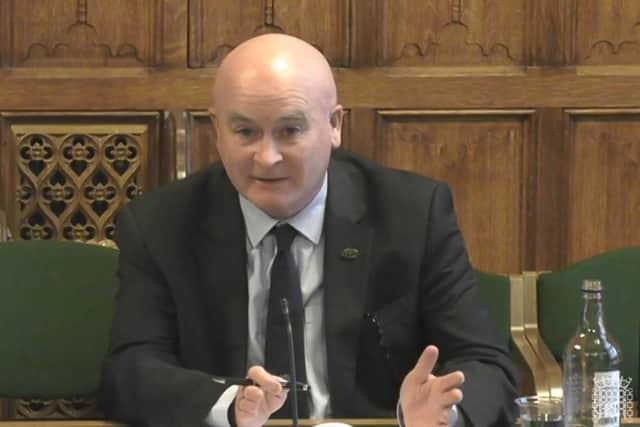Forcing rail staff to work during strikes is ‘a recipe for disaster’, trade union bosses warn
The Government is attempting to introduce legislation that will require companies to run a certain amount of services when their workers walkout, to minimise disruption for passengers.
Mick Lynch, General Secretary of the RMT, and Mick Whelan, General Secretary of the train drivers’ union ASLEF, said that forcing some members of staff to work on strike days would not guarantee a reliable service and it could jeopardise passenger safety.
Advertisement
Hide AdAdvertisement
Hide AdMr Lynch said the “undemocratic” proposals “will not work and will not serve passengers”.


“Conscripting people to go past their own union’s picket lines and operate complex signalling systems or drive trains is a recipe for disaster in my opinion,” he said.
“You cannot run an 80 or 90 per cent, or even a 50 per cent railway service without conscripting all of the signallers and all of the controllers to operate that network.”
Mr Lynch also said trade unions would not sit down with the Government and train companies to resolve disputes if their members were being sacked for refusing to work on strike days, and there would be a series of costly legal challenges.
Advertisement
Hide AdAdvertisement
Hide Ad“It will be a disaster,” he said. “We’ll all end up in court and they will spend more money fighting these cases than they have trying to break these strikes.”
Mr Whelan said the Government’s plans to impose minimum service levels remain unclear, as it has not explained whether it wants train companies to run a certain percentage of services on strike days or prioritise its busiest routes.
But he also said it is “inherently unsafe” to run a rail network with a relatively small number of staff who have been pressured into going to work that day.
He said the legislation could “dramatically increase” expectations and result in a large number of passengers attempting to travel on fewer services during strike days.
Advertisement
Hide AdAdvertisement
Hide Ad“In European countries where they have minimum service levels they are never applied,” he said. “They are generally not applied because they can’t do it safely.”
The Strikes (Minimum Service Levels) Bill was introduced in January and it is currently being scrutinised in the House of Lords.
The Government said it wants to ensure some rail services run safely on strike days, so people can use a “vital public service”.
It comes as the RMT and other unions have staged a series of strikes which have caused widespread disruption on the railways over the last year, amid rows about pay and conditions.
Advertisement
Hide AdAdvertisement
Hide AdASLEF is being urged to resolve a dispute with TransPennine Express and allow its drivers to work overtime again, so they can cover for absent colleagues and train new recruits for the first time since December 2021.
TransPennine Express said an agreement would significantly reduce the number of cancellations affecting passengers.